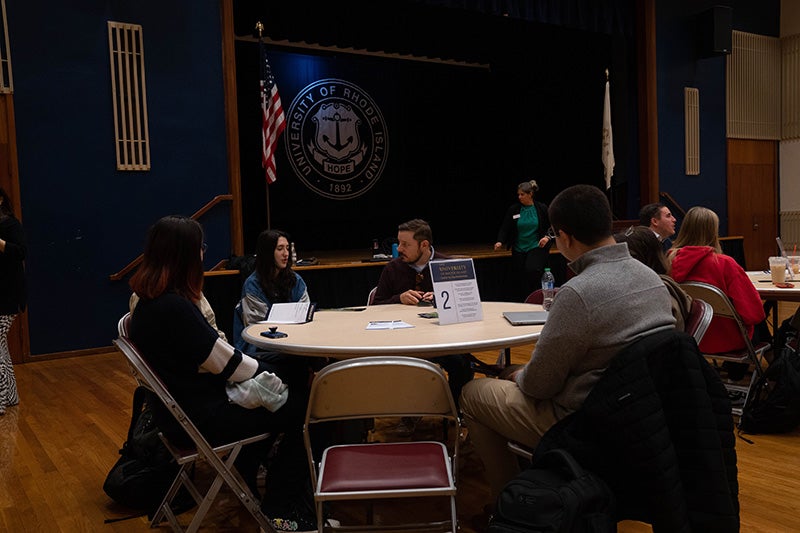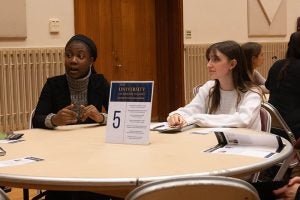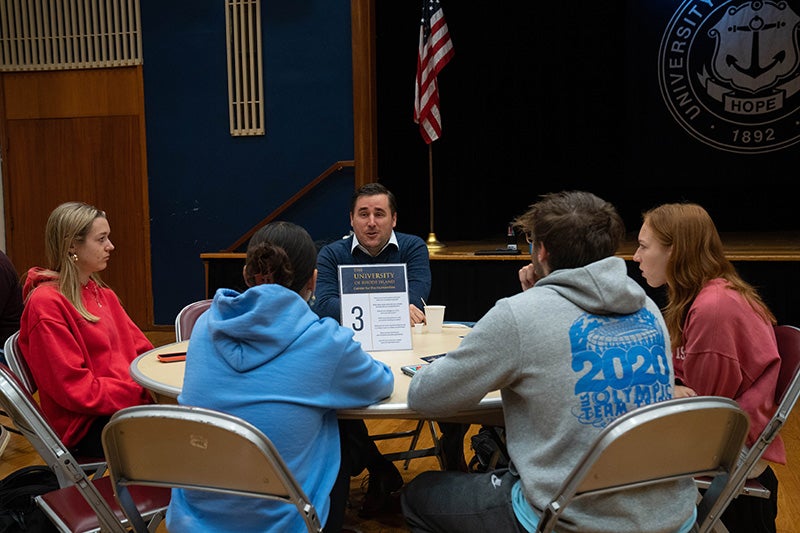KINGSTON, R.I. – Nov. 15, 2022 – When it comes to preparing students for careers, the humanities disciplines sometimes get a bad rap. But at a recent event sponsored by the URI Center for Career and Experiential Education and the Center for the Humanities, students learned how the skills they develop in the humanities can translate directly into career success after graduation.
The annual event, called Linking Humanities to Careers, brings current humanities students together with URI alumni—all of whom turned their humanities education into successful careers in government, business, and elsewhere. Students and alumni interact in a “speed-networking” format, where alumni move from table to table and chat informally with groups of five or so students. This year’s event was held on Nov. 10 in the Memorial Student Union Ballroom.
“This is a really great opportunity for students in majors like English, history, philosophy or languages to figure out what they might be able to do with their degrees,” said Eve Sterne, director of the Center for the Humanities. “We’re appreciative of our alums who come back to share their experiences and talk about the variety of options students can pursue.”
Alumni participants included Johnathan Berard, a history and political science major who is now director of communications and strategy for Rhode Island Secretary of State Nellie Gorbea; Daniel Marran, an attorney who triple majored in philosophy, Spanish, and political science; and Kelly Primus, a history major who is CEO of the consulting firm Leading NOW.

Topics of conversation around the tables included developing networking strategies, creating a resume that gets noticed, exploring what career options may be available, and more. Many of the alumni shared insights into how their training in the humanities serves them well in their careers.
Berard said that his work in the Secretary of State’s office requires him to write constantly, a skill that he honed as a history major. Another skill that Berard says has played a major role in his success is the ability to do careful research and communicate the findings.
“My background as a humanities major taught me that skill to take information—whether it’s wonky or just voluminous—and distill it down into a bite-sized package that’s going to be engaging for the audience that I’m trying to reach,” he said.
Berard also spoke to students about the importance of networking in finding one’s career path.
“My advice is to find someone with a cool job that you think you might want to do and reach out to them; offer to buy them a cup of coffee,” he said. “The most important thing you can do is to have a one-on-one conversation and just build that relationship.”

Jen Riley, dean of URI’s College of Arts and Sciences, said events like this are reflective of the emphasis that the college is placing on career readiness.
“We want to remind our students that when you go out into the workplace, you have the skills to be successful,” Riley said. “It’s not surprising that when you look at Fortune 500 companies in the United States that so many of them are led by humanities majors. So don’t think that you can’t go out and make a difference in any industry. You have skills that are adaptable, flexible and that give you the ability to shift and change.”
Emily Ackroyd, a junior majoring in English literature and secondary education with a minor in French, said the event was a good reminder for students of how their skills can translate to the workplace.
“Just having English as a major can seem intimidating because it’s so broad and we don’t stop to consider the critical thinking skills and how deeply you have to think,” she said. “I recommend people coming to these events just because networking is essential in getting a leg up.”

